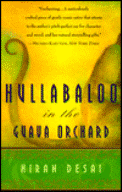
Summary
Praised by Salman Rushdie as “lush and intensely imagined,” Kiran Desai's wryly comic story of life, love, and family relationships simultaneously captures the vivid culture of the Indian subcontinent and the universal intricacies of human experience. A failure at school and a failure at work, a dreamer who spends his days dreaming in tea stalls and singing to himself in public gardens, 20-year-old Sampath Chawla hardly seems destined for great things. But one day, after climbing a guava tree in search of peaceful contemplation, Sampath awakes to find himself proclaimed “the Hermit of Shakhot.” Embracing his new career as a holy man, Sampath unburdens himself of a wealth of hilariously prosaic and often uncanny revelations that upset the social equilibrium of his small hometown and send its outrageous inhabitants careening out of control.
From the Publisher
Hullabaloo in the Guava Orchard is the story of Sampath Chawla, born in a time of drought into a family not quite like other families, in a town not quite like other towns. After years of failure at school, failure at work, of spending his days dreaming in the tea stalls and singing to himself in the public gardens, it does not seem as if Sampath is going to amount to much. “But the world is round,” says his grandmother. “Wait and see!” No one believes her, until one day Sampath climbs a guava tree in search of peaceful contemplation and becomes unexpectedly famous as a holy man. Sampath's newfound fame sends the tiny town of Shahkot into turmoil. His feisty sister falls in love with the very unsuitable Hungry Hop Ice Cream Boy; a syndicate of larcenous, alcoholic monkeys terrorizes the pilgrims who cluster around Sampath's tree; his father attempts to turn the orchard into a highly profitable carnival scene; and an overzealous spy determines to get to the bottom of it all and, to his consternation, achieves this goal in a most unpleasant way.
From Library Journal
Desai's first novel is a wild, sad, humorous story about the oldest son of an eccentric family in a small Indian village. Born at the moment a crash of thunder signals the end of a long, hot drought, Sampath grows into a disappointing young man. After he loses a job, Sampath's mother attempts to comfort him with a guava, but it explodes as Sampath is admiring its green coolness, compelling him to flee his family and village to an abandoned orchard, climb into a guava tree, and stay there. He quickly becomes known as the tree baba. The rest of the family moves to the orchard with Sampath's ambitious father, who is determined to exploit the economic possibilities of the newly proclaimed baba. Desai's novel is full of wonderfully portrayed characters and beautifully vivid descriptions of animals, plant life, and the dusty environs of the village.
About the Author
Kiran Desai was born in India in 1971, she lived in Delhi until she was 14, then spent a year in England, before her family moved to the USA. She completed her schooling in Massachusetts before attending Bennington College; Hollins University and Columbia University, where she studied creative writing, taking two years off to write Hullabaloo in the Guava Orchard.
Her mother is Anita Desai, author of many books, three of which have been short listed for the Booker Prize (Clear Light of Day (1980), In Custody (1984) and Fasting, Feasting (1999). Anita Desai currently teaches writing at MIT. Her maternal grandmother was German, but left before the World War II and never returned. Her grandfather was a refugee from Bangledesh. Her paternal grandparents came from Gujarat, and her grandfather was educated in England. Although Kiran has not lived in India since she was 14, she returns to the family home in Delhi every year.
She first came to literary attention in 1997 when she was published in the New Yorker and in Mirrorwork, an anthology of 50 years of Indian writing edited by Salman Rushdie - Strange Happenings in the Guava Orchard was the closing piece. In 1998, Hullabaloo in the Guava Orchard, which had taken four years to write, was published to good reviews. She says, “I think my first book was filled with all that I loved most about India and knew I was in the inevitable process of losing. It was also very much a book that came from the happiness of realizing how much I loved to write.”
Eight years later, The Inheritance of Loss was published in early 2006, and won the 2006 Booker Prize. When talking of the characters in The Inheritance of Loss, and of her own life, she says, “The characters of my story are entirely fictional, but these journeys (of her grandparents) as well as my own provided insight into what it means to travel between East and West and it is this I wanted to capture. The fact that I live this particular life is no accident. It was my inheritance.”
The Inheritance of Loss is set partly in India and partly in the USA. Desai describes it as a book that “tries to capture what it means to live between East and West and what it means to be an immigrant,” and goes on to say that it also explores at a deeper level, “what happens when a Western element is introduced into a country that is not of the West”—which happened during the British colonial days in India, and is happening again “with India's new relationship with the States.” Her third aim was to write about, “What happens when you take people from a poor country and place them in a wealthy one. How does the imbalance between these two worlds change a person's thinking and feeling? How do these changes manifest themselves in a personal sphere, a political sphere, over time?”
As she says, “These are old themes that continue to be relevant in today's world, the past informing the present, the present revealing the past.”

